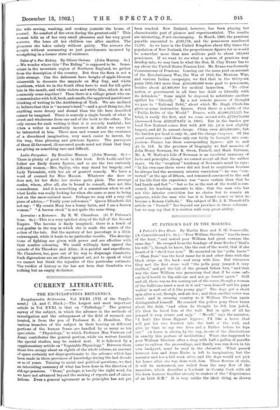C EIRRENT LITERATURE.
THE ENCYCLOPAEDIA BRITANNICA.
Encyclopaedia Britannica. Vol. XXXI. (VII. of the Supple- ment.) (A. and C. Black.)—The longest and most important article in Vol. XXXI. is that on "Pathology." The general survey of the subject, in which the advance in the methods of investigation and the enlargement of the field of research are treated, is from the pen of Professor D. J. Hamilton. The various branches of the subject in their bearing on different portions of the human frame are handled by as many as ten specialists. "Physiology," to which Professor Max Verworn (of Jena) contributes the general portion, while six writers furnish the special studies, may be ranked next. It is followed by a supplementary article on "Vegetable Physiology." Between them these two occupy about an eighth of the whole volume, an amount of space certainly not disproportionate to the advance which has been made in these provinces of knowledge during the last decade or so of years. Turning to social and political questions, we find an interesting summary of what has been done in the direction of old-age pensions. "Done," perhaps, is hardly the right word, for we have not advanced beyond the making of reports and of calcu- lations. Even a general agreement as to principles has not yet been reached. New Zealand, however, has been playing her characteristic part of pioneer and experimentalist. The results are interesting, if not encouraging. In March, 1900, the pensions payable amounted to £193,718, and the pensioners numbered 11,285. As we have in the United Kingdom about fifty times the population of New Zealand, the proportionate figures for us would be somewhat more than nine millions paid to about 560,000 pensioners. If we want to see what a system of pensions may develop into, we may turn to what the Hon. H. Clay Evans has to say about the United States Pension List. Mr. Evans was formerly Commissioner of Pensions. Leaving out the sums paid on account of the Revolutionary War, the War of 1812, the Mexican War, and various Indian campaigns, we find that in the thirty-six years 1865-1901 more than £550,000,000 were paid to pensioners, besides about £3,400,000 for medical inspection. "No other nation or government in all time has dealt so liberally with. its defenders." Some might be disposed to substitute another epithet for "liberally." By a not remote process of thought we pass to "National Debt," about which Mr. Hugh Chisholm.. gives us some instructive figures. First there is a table of the "Public Debts of the World." France, with £1,086,215,525 for total, is easily the first, and we come second with £779,876,000. (increased from £628,978,872 in 1900). But in the burden per head Now Zealand comes first with £58 12s. (it is now slightly larger), and £2 2s. annual charge. China owes £55,000,000; but the burden per head is only 3s., and the charge twopence. Of the great countries—and these only can fairly be brought into com- parison—France has these corresponding figures : £28 4s. and £1 5s. lid. In the province of biography wo find memoirs of John Henry Newman, Sir R. Owen, Parnell, and Mark Pattison. Mr. A. W. Hutton's Life of Newman is an excellent summary of facts and principles, though we cannot accept all that the author urges. On the "sceptical" tendency of Newman's mind he says : "In his own case these views did not lead to scepticism because he always had the necessary interior conviction "—ho was "con- verted" at the age of fifteen, and remained convinced to the end of his life that the experience was "more certain than that he had hands and feet "—" but so far as the rest of the world is con- cerned, his teaching amounts to this : that the man who has not this interior conviction has no choice but to remain an agnostic, while the man who has it is bound sooner or later to. become a Roman Catholic." The subject of Mr. J. R. Thursfield'a article on " Parnell " lies beyond our province in these columns but we may say that it is written with very groat ability.


















































 Previous page
Previous page